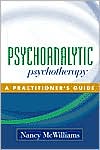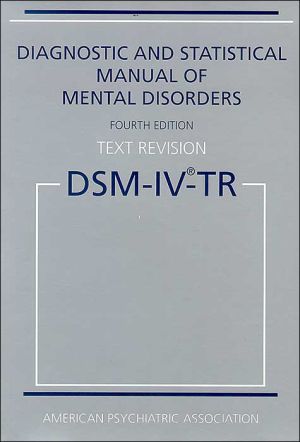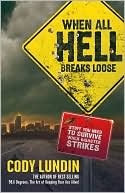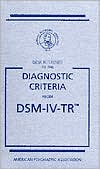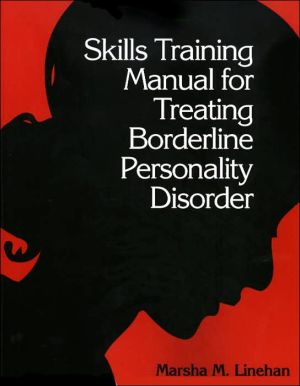Psychoanalytic Psychotherapy: A Practitioner's Guide
Building on the enormous popularity of her two previous texts on diagnosis and case formulation, this important work from Nancy McWilliams completes the trilogy by addressing in detail the art and science of psychodynamic treatment. McWilliams distills the essential principles of clinical practice, including effective listening and talking; transference and countertransference; emotional safety; and an empathic, attuned attitude toward the patient. The author describes the values,...
Search in google:
Building on the enormous popularity of her two previous texts on diagnosis and case formulation, this important work from Nancy McWilliams completes the trilogy by addressing in detail the art and science of psychodynamic treatment. McWilliams distills the essential principles of clinical practice, including effective listening and talking; transference and countertransference; emotional safety; and an empathic, attuned attitude toward the patient. The author describes the values, assumptions, and clinical and research findings that guide the psychoanalytic enterprise, and shows how to integrate elements of other theoretical perspectives when necessary. She also discusses the phases of treatment and covers such neglected topics as educating the client about the therapeutic process, handling complex challenges to boundaries, and attending to self-care. Presenting complex clinical information in personal, nontechnical language enriched by in-depth clinical vignettes, this is an essential psychoanalytic work and training text for therapists. Doody Review Services Reviewer:Gary B Kaniuk, Psy.D.(Cermak Health Services)Description:This book provides the basics about psychoanalytic psychotherapy and the author addresses theory and practice in a very readable manner.Purpose:According to the author, "the impetus for this book is my sense that despite an abundance of good writing on the psychotherapy process, we lack an integrative work on psychotherapy that introduces students of the art to its essential features -- across populations, across pathologies, across the sometimes radically differing paradigms currently in vogue in the psychoanalytic community, across the variations in human misery that express the idiosyncrasies of particular families in particular places in a particular age." (p. ix) She also states: "This book emphasizes how helpful psychoanalytic therapies can be for less healthy clients and for those who cannot undertake analysis even if they are good candidates for it." (p. xvi) The book meets these very worthy objectives.Audience:According to the author, "as with my previous texts, with this book I am trying to be helpful mostly to people in training, whether in psychology, counseling, psychiatry, general medical practice, social work, nursing, or faith-based practice." (p. ix) I agree with the author regarding the targeted audience. However, I think that seasoned practitioners will also benefit greatly from this information. The author is a credible authority. Dr. McWilliams teaches psychoanalytic theory and therapy at Rutgers and is a graduate of the National Psychological Association for Psychoanalysis. She has authored two other books on psychoanalytic therapy as well.Features:The book covers the whole gamut of psychoanalytic therapy, interweaving theory with practice. Most of the chapters deal with the actual therapeutic issues, such as therapist's preparation, preparing the client, basic therapeutic processes, and boundaries. Two very thorough case studies are also included. I really enjoyed the two chapters on boundaries. The author has a very good handle on therapy and her many years of experience come through loud and clear in the material. She concludes the book with a chapter on self-care. Her ideas on care of the id, ego, and superego are really good and practical. Therapists would be well served by taking heed to her sage advice.Assessment:This is a wonderful book, written by a seasoned veteran who is able to communicate ideas in a very readable manner. As I read the material, I found myself saying, "Yes, yes." Therapists of any orientation can gain a considerable amount because her ideas address therapy issues which we all encounter. For those in the psychodynamic camp, it should be considered "must" reading. I appreciate the author's direct and candid style.
Ch. 1What defines a psychoanalytic therapy?1Ch. 2The psychoanalytic sensibility27Ch. 3The therapist's preparation46Ch. 4Preparing the client73Ch. 5Boundaries I : the frame99Ch. 6Basic therapy processes132Ch. 7Boundaries II : quandaries163Ch. 8Molly197Ch. 9Donna219Ch. 10Ancillary lessons of psychoanalytic therapy241Ch. 11Occupational hazards and gratifications260Ch. 12Self-care285App.: annotated bibliography305References311Author index335Subject index343
\ From the Publisher"McWilliams presents a text that will be useful to all social workers, whether or not they primarily have a psychoanalytic orientation. She provides useful information on, for example, how to develop a trusting relationship, how to overcome communication barriers, and how to deal with myriad technical problems, such as challenges to the practitioner and to the boundaries that are required in practice. Her writing style is clear, jargon-free, and full of useful examples, and she is supportive of the integration of her ideas with other approaches. A much-needed book in the social work field."--Charles Garvin, PhD, School of Social Work (Emeritus), University of Michigan\ "Books by Nancy McWilliams used in unison make the best psychodynamic resources I have yet encountered in more than 60 years in the field."--Robert C. Lane, PhD, Department of Psychology, Nova Southeastern University\ "A cornucopia of wise and sensitive reflections on psychoanalytic psychotherapy. McWilliams delineates the felt core of therapeutic work shared by workers of many schools, but rarely articulated so well. She gives the beginner a 'taste of the apple' in a hands-on and feeling way, and bolsters the spirit of the old-timer, who will recognize the fruit of attentive and caring practice."--Michael Eigen, PhD, author of The Sensitive Self\ "Nancy McWilliams's book reads like a conversation with a master therapist, addressing the most important questions about facilitating the therapeutic process. Although a psychoanalyst herself, Dr. McWilliams makes frequent, respectful references to the other major theoretical schools, and gives practical advice that will help any new or seasoned therapist acquire skills for understanding and treating clients."--Karen J. Maroda, PhD, Department of Psychiatry, Medical College of Wisconsin\ "This book addresses a daunting range of issues. How can therapists set limits with acting-out patients? What did Freud really say about behavior change? Why should practitioners have their own psychotherapy? In an era that scorns depth psychology in favor of the quick fix, Nancy McWilliams' work is a beacon of sane reflection. She sees psychoanalysis not as a clinical specialty alone, but as an ethic--a way of thinking that both requires and makes possible the difficult path known as the examined life. This perspicacious, deeply personal work is sure to become a key text for novice and experienced therapists alike."--Deborah Anna Luepnitz, PhD, author of Schopenhauer's Porcupines\ "This is vintage McWilliams: erudite, elegantly written, thoughtful, and as useful to the seasoned clinician as to the aspiring clinician. Nancy McWilliams has a true talent for tackling complexity without jargon or pretense, and for mixing theoretical originality with good clinical horse sense. Reading this book feels like getting supervision from one of the eminent clinicians of our time."--Drew Westen, PhD, Department of Psychology and Department of Psychiatry and Behavioral Sciences, Emory University\ "Written for therapists, by a therapist, Psychoanalytic Psychotherapy manifests the qualities of McWilliams’s earlier superb work: a thorough grasp of psychodynamic theory, frequent use of case illustrations, a clear and engaging writing style, and what we might call her 'faith' that a relationship with a skilled and caring therapist can help people become more whole."--Russell Jones, ThD, pastoral counselor, Asheville, North Carolina\ "Readers of McWilliams's previous books will find what they have come to expect: graceful, transparent writing; clear thinking; and a sharpshooter's aim on critical issues. Reading this book is like going on rounds with a loved and trusted professor whose teaching is conversational, collegial, and deep. McWilliams speaks her mind confidently. Her thinking embraces all the therapies derived from psychoanalysis, integrating them under the rubric of honesty. Her book fulfills the promise of its title, addressing both theory and the practical issues that often derail the work of beginners and experienced clinicians alike. This book will be an essential text for teachers of undergraduate psychology through to those in analytic institutes, and psychotherapy students of all stripes will want to read it closely."--Ann Halsell Appelbaum, MD, Department of Psychiatry, Columbia University College of Physicians and Surgeons\ \ \ \ \ \ \ Bulletin of the Menninger Clinic"Nancy McWilliams [is]...an insightful scholar, an engaging author, and a respected synthesizer of, and contributor to, the accumulated wisdom of the psychoanalytic enterprise. This reputation is founded, in part, on two previous books that have been widely read and admired: Psychoanalytic Diagnosis (1994)...and Psychoanalytic Case Formulation 1999...Psychoanalytic Psychotherapy completes the trilogy....Many prominent reviewers of this book have already commented on the wide-ranging clinical wisdom that it transmits....It is not unusual for a book jacket to describe a psychotherapy text as essential reading that is equally valuable for trainees and experienced therapists. Although this seldom may truly be the case, I believe that it is the case with all three books in McWilliams' outstanding trilogy."--Bulletin of the Menninger Clinic\ \ \ The American Journal of Psychoanalysis"Stands as a beacon, not simply recalling, but recreating the tenets of psychoanalytic practice in a broad-minded and frank way....This book will be a godsend to beginning therapists, and yet a stimulating read for the more experienced practitioner. McWilliams has a rare ability to celebrate the pluralities in our practices, despite deep division in theory and so-called techniques, while emphasizing the fundamental similarities in practice necessary to create and foster therapeutic relationships....McWilliams' style is accessible, candid, and humorous....Along with her warmth, perspective, and inclusiveness, McWilliams offers us a formidable array of references on every topic relevant to practice, from therapy outcome research to legal dilemmas to the importance of self-care."--The American Journal of Psychoanalysis\ \ \ \ \ Psychologist-Psychoanalyst APA Division 39 Newsletter"Provide[s] highly useful discussions of many topics not typically found [in] therapy texts, especially those emphasizing a particular technique. Those of us who supervise trainees commonly encounter these topics and the text will go a long way in providing an articulate source for trainees to refer to when faced with such issues....practitioners at all levels of experience can take in the benefits of the book."--Psychologist-Psychoanalyst APA Division 39 Newsletter\ \ \ \ \ The Journal of Nervous and Mental Disease"The author fully meets the task she sets out to accomplish using her experiences both as therapist and patient....For those entering the field, it is a must-have text, and for seasoned practitioners it offers much food for thought."--The Journal of Nervous and Mental Disease\ \ \ \ \ From The CriticsReviewer: Gary B Kaniuk, Psy.D.(Cermak Health Services)\ Description: This book provides the basics about psychoanalytic psychotherapy and the author addresses theory and practice in a very readable manner.\ Purpose: According to the author, "the impetus for this book is my sense that despite an abundance of good writing on the psychotherapy process, we lack an integrative work on psychotherapy that introduces students of the art to its essential features — across populations, across pathologies, across the sometimes radically differing paradigms currently in vogue in the psychoanalytic community, across the variations in human misery that express the idiosyncrasies of particular families in particular places in a particular age." (p. ix) She also states: "This book emphasizes how helpful psychoanalytic therapies can be for less healthy clients and for those who cannot undertake analysis even if they are good candidates for it." (p. xvi) The book meets these very worthy objectives.\ Audience: According to the author, "as with my previous texts, with this book I am trying to be helpful mostly to people in training, whether in psychology, counseling, psychiatry, general medical practice, social work, nursing, or faith-based practice." (p. ix) I agree with the author regarding the targeted audience. However, I think that seasoned practitioners will also benefit greatly from this information. The author is a credible authority. Dr. McWilliams teaches psychoanalytic theory and therapy at Rutgers and is a graduate of the National Psychological Association for Psychoanalysis. She has authored two other books on psychoanalytic therapy as well.\ Features: The book covers the whole gamut of psychoanalytic therapy, interweaving theory with practice. Most of the chapters deal with the actual therapeutic issues, such as therapist's preparation, preparing the client, basic therapeutic processes, and boundaries. Two very thorough case studies are also included. I really enjoyed the two chapters on boundaries. The author has a very good handle on therapy and her many years of experience come through loud and clear in the material. She concludes the book with a chapter on self-care. Her ideas on care of the id, ego, and superego are really good and practical. Therapists would be well served by taking heed to her sage advice.\ Assessment: This is a wonderful book, written by a seasoned veteran who is able to communicate ideas in a very readable manner. As I read the material, I found myself saying, "Yes, yes." Therapists of any orientation can gain a considerable amount because her ideas address therapy issues which we all encounter. For those in the psychodynamic camp, it should be considered "must" reading. I appreciate the author's direct and candid style.\ \ \ \ \ 4 Stars! from Doody\ \
